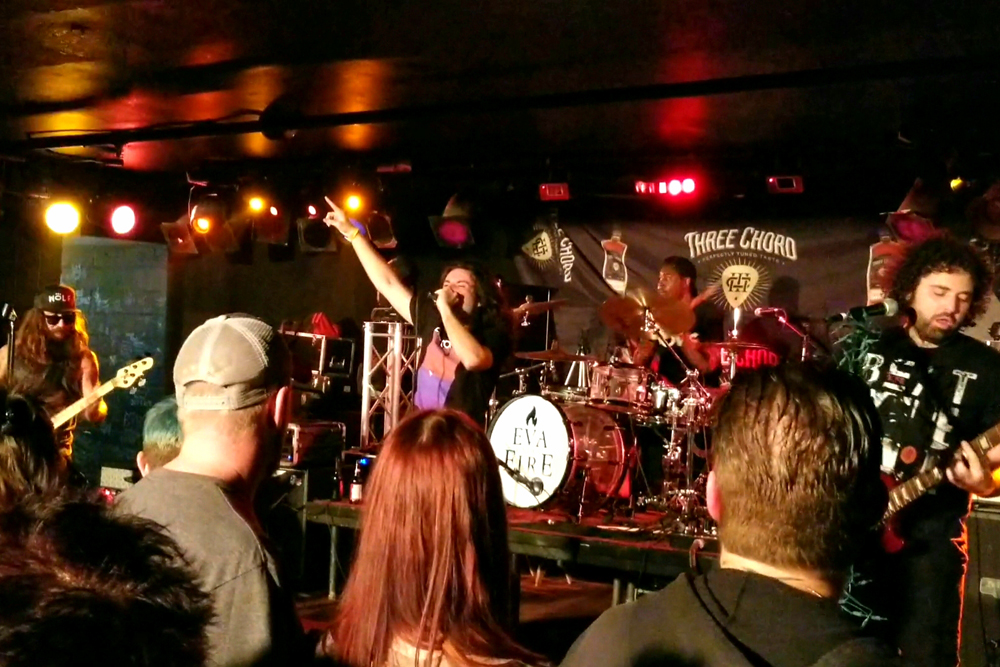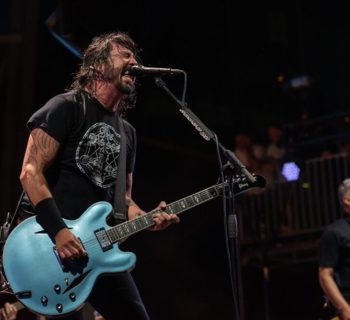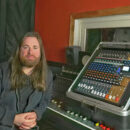With two Grammy nominations, 16 million albums sold, over two billion streams and five platinum or better albums, modern metal gods Disturbed have reached a rarefied level of success. Unleashing their latest opus this past October, lead singer David Draiman, drummer Mike Wengren, bassist John Moyer and guitarist Dan Donegan notched their 12th #1 single at rock radio with “Are You Ready.”
Where one might anticipate an unruly, frenetic example of rock & roll royalty, sitting at the center of this storm exists an exceptionally bright, Zen-like figure brimming with gratitude. Draiman’s shining, multi-layered vocals, in combination with his acutely uncanny songwriting abilities, have catapulted Disturbed into the lofty atmosphere of heavy music legends with some of their greatest hits, including “Down with the Sickness,” “Indestructible” and “Stupify.”
On Evolution, Draiman continues this streak, penning some of the disc’s most memorable tracks. “A Reason to Fight” champions those who struggle with addiction and depression. “No More” is a timeless diatribe against war profiteers. “Hold On To Memories” implores the listener to savor every moment. And “Savior of Nothing” excoriates those who’ve assumed the mantle of social justice to such an extreme that they’ve become exactly what they’re fighting against.
It’s a remarkably diverse and thoughtful batch of sentiments one doesn’t always get from a metal act. It’s also a mark of the extent to which the group has matured since their formation in 1994 and a collection of songs they insist triumphs over anything they’ve done before. Draiman chattered with us from his home in Oahu, Hawaii, detailing some of the finer notes of this latest incarnation and what it’s like both attaining and maintaining his vaunted position as one of rock’s great vocalists.
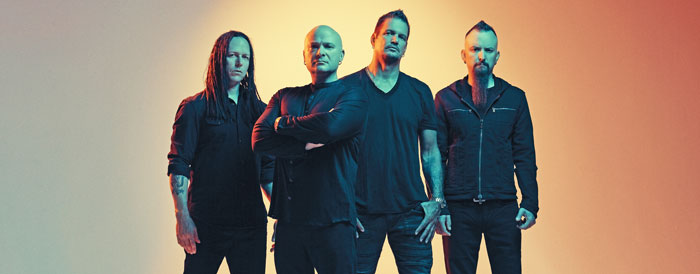 Music Connection: The new album is named Evolution. Is that a reference to the band’s sound? How has your material changed?
Music Connection: The new album is named Evolution. Is that a reference to the band’s sound? How has your material changed?
David Draiman: It’s a title that was literally the last piece of the puzzle on this record. The songs had been written and we were struggling to determine what to call it. It was Danny’s [Dan Donegan] suggestion to call it Evolution. It just seemed to make perfect sense because the album feels like an evolution. The minute he made the suggestion it instantly resonated with everybody.
MC: Did having a child affect the types of songs you write?
Draiman: It changes your entire world. We’re all parents now and it changes the way you look at the world dramatically. If you were a defensive individual to begin with, prepare for that to be multiplied a hundredfold when you’re a parent. If you were agro before, you’re probably not going to be more laidback once there’s a kid in the equation. It intensifies everything. Everything takes on added meaning.
MC: I wonder if “Hold On To Memories” wouldn’t have been written before you guys had kids.
Draiman: It’s not so much about kids per se. It’s something that definitely applies to my relationship with him [Draiman’s son, Samuel Bear Isamu Draiman], as the song encourages you to make the most of the time you have and with the precious ones in your life.
MC: Do you consider yourself more of a singer or a songwriter? Or are the two intertwined?
Draiman: To me, they’re intertwined. There are those who are just pure singers, who don’t have the other end of the gift. And it is a gift because it isn’t something you can be taught. How to come up with that mystical combination of notes that, for whatever reason, resonates within a human being better than another is not something you can teach. It is not science. It is all feel. That’s something you either have or you don’t. It’s a huge blessing that I have this ability to create. It’s something I’m thankful for every day of my life.
MC: You guys have a lot of different feelings that move your music into territory that doesn’t fit into a particular genre. But people like to put others into boxes. You’ve been tagged as nu metal, which you’ve rejected. Why do people want to put people into camps?
Draiman: I think it makes them comfortable. It helps them know how to identify what it is they’re being exposed to. The nu metal thing I never got because we never rap, we’ve never had a turntable. All of the elements that are parts of being a nu metal band were never part of what we did. But we came up at the same time as those guys were enjoying a tremendous amount of success so we got slapped with that label.
If we had come up during the time [Iron] Maiden and [Judas] Priest were dominating things in the mid-‘80s, I don’t think there would be any question how we would be identified. At this point, I don’t know that the label is all that important, but I know that there are plenty of bands––whether they’re rock, hard rock or metal––that explore new territory. This was a change of direction that felt so gratifying. We went with it and ended up producing material that is, in our opinion, some of the best stuff we’ve ever written. That’s all you can try to do.
MC: You guys like doing different stuff, like your cover of Simon & Garfunkel’s “The Sound of Silence.” Did you get pleasure out of people not expecting you to sing a song like that?
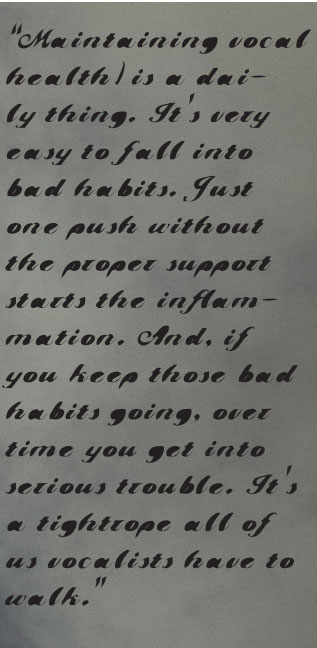 Draiman: I got pleasure out of not expecting what it would sound like as we did it. It had been since “Darkness” on the Believe record that I’d attempted to utilize that classical background and go in that direction. And for it to come out the way it did was a shock to my system. It was so jarring that I literally couldn’t contain my emotions. It was a heavy moment. If it did that to me and the rest of the guys when they heard it, we thought for sure people are going to feel this. And that’s all you can ever really trust. No matter what theory you’re taught, no matter what it looks like on paper or on a Pro Tools graph, it’s all about how it makes you feel and either you’ve honed into something or you haven’t.
Draiman: I got pleasure out of not expecting what it would sound like as we did it. It had been since “Darkness” on the Believe record that I’d attempted to utilize that classical background and go in that direction. And for it to come out the way it did was a shock to my system. It was so jarring that I literally couldn’t contain my emotions. It was a heavy moment. If it did that to me and the rest of the guys when they heard it, we thought for sure people are going to feel this. And that’s all you can ever really trust. No matter what theory you’re taught, no matter what it looks like on paper or on a Pro Tools graph, it’s all about how it makes you feel and either you’ve honed into something or you haven’t.
MC: Your voice, especially on that song, is so powerful. You can sing clear notes and transition to darker, more metal tones. How do you achieve the control that allows you to shift your voice in that way? Are there exercises that help you do that?
Draiman: There are. It’s really about having the right breath support. Putting a bit of distortion, a bit of grit, on the vocal, making it a bit more agro, doing that while maintaining melody is a very difficult technique. Melissa Cross is my vocal coach. She’s the best in the business, particularly at rock and metal vocal delivery in terms of utilizing that distorted vocal sound. It’s much easier to do something monotone and be aggressive with it. To do a metalcore tonality is easier to replicate consistently than to add distortion to a melodic vocal, because carrying a melody requires control. If you’re already trying to affect your control or that melody by distorting it, it becomes a much more finesse-oriented, specialized sort of discipline.
MC: Do you have a regular vocal regimen?
Draiman: Oh yeah. It’s a daily thing. It’s very easy to fall into bad habits. Just one push without the proper support starts the inflammation. All it takes is one and you’re compromised. All of a sudden, you’re sore when you don’t need to be. And, if you keep those bad habits going, over time you get into serious trouble. It’s a tightrope all of us vocalists have to walk.
MC: You have a live version of “The Sound of Silence” with Myles Kennedy on this album. How did that come about?
Draiman: We were on tour with Alter Bridge last cycle. It was one of the most successful summer runs we’ve ever had. I don’t remember exactly how it went down. It might have been Mark Tremonti who said that Myles had been experimenting with a harmony for our live version of “The Sound of Silence.” I ended up going to their dressing room and we ran through it and nailed it our first time trying it. It felt like, dude, we have to do this. Later that night, we ran it at sound check just to get a feel of where it would sit in our mixes and did it that night.
Our monitor engineer happened to record it. The YouTube clips of it from the crowd ended up going all over the place. It got a lot of play on its own. But we had the recording and it came out so beautifully. It was such a great moment that we had to throw it on the record.
MC: One of our favorite tracks on the album is “A Reason To Fight.” Is that a personal song?
Draiman: All the songs are personal, but that one in particular is especially personal to every member of the band. Each one of us has had our own dealings with people we’ve loved who have fallen prey to addiction and depression. This is just our effort to maybe be a bit of a wakeup call, be some sort of beacon of hope and encourage people to intervene and not wait until they can’t do anything more when they’re standing over the grave at a funeral. And give people a reason to keep fighting the demon.
MC: You’ve got a number of politically oriented tracks. Was that a conscious choice?
Draiman: When we go political, we try to make sure the knife cuts both ways. The forces that precipitate the vicious cycle of conflict on this planet do not pledge allegiance to either the left or the right or the center. They take advantage of everyone. It’s not a conspiracy theory to think there are people who profit from us killing each other. And why should we continue to perpetuate that vicious cycle?
“Savior of Nothing” calls out the would-be social justice warriors of the world who become so enveloped in fighting so passionately that they become exactly what they’re trying to correct. They preach acceptance so much they become unaccepting. “In Another Time” talks about our addiction to technology. When we touch on any subject matter that can be deemed “political,” I like for it to be something that’s applicable to people no matter what side of the fence they fall on.
MC: You’ve stopped speaking out as vocally as you had before on social media. What’s your advice to artists who want to remain politically active but don’t want to alienate fans?
Draiman: It’s impossible. You’re going to end up alienating somebody no matter what you do. It’s impossible to utilize your right to free speech in the way you truly deserve and not suffer repercussions on any level. So your best bet, to be honest, is to simply not engage in it. Be something that sets people free from that, not throws them back into it.
Don’t get me wrong. There are plenty of great rallying cries and protest songs. We write them ourselves. But it’s one thing to write about a subject matter you’re passionate about as an artist and another thing after you’ve put the microphone down and then pick it back up and start preaching from a podium. If you’re willing to do that, more power to you. Just know there are going to be consequences. It’s simply something I’m no longer willing to engage in on any level.
MC: You’ve just had your 12th number one single.
Draiman: Thank God.
MC: What accounts for your track record and longevity?
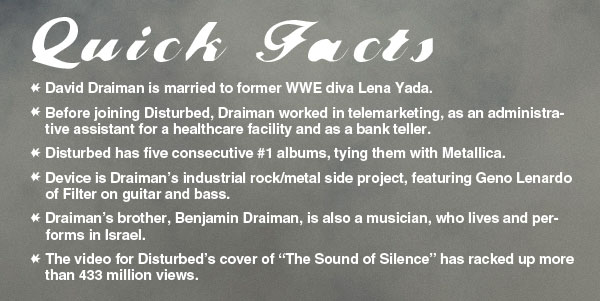 Draiman: It’s rare in life that you’re able to find the people that you’re meant to write and create with. We’re very fortunate that our well has not run dry over all these years. We still have the creative juices.
Draiman: It’s rare in life that you’re able to find the people that you’re meant to write and create with. We’re very fortunate that our well has not run dry over all these years. We still have the creative juices.
This particular recording session was one of the most, if not the most, magical we’ve experienced together. Literally 70 - 80% of the record was written in studio, all of us witnessing it as it was unfolding. It was an incredible experience.
MC: Where did you record it?
Draiman: In Kevin Churko’s studio, The Hideout, in Las Vegas.
MC: Was that a new studio for you?
Draiman: The studio itself was new to us, but we had worked with Kevin Churko on the previous record, Immortalized. He’d been in a different building and studio at the time.
MC: You’ve been with Reprise for a long time. Why is that?
Draiman: Nobody does rock better than the Warner family. We’ve been free agents and just re-signed for one record at a time with Warner each specific time. We’ll be freed up again but there’s really no reason to go anywhere because the Warner team, especially with what they did with the launch for this record in conjunction with our new management at Q Prime, was just unbelievable. It’s one of the best launches we’ve ever had.
MC: Do you have advice for young artists? What should they do to get their careers on point?
Draiman: Go into a different line of work. [laughs] It’s the most difficult period of time to ever try and become a commercially successful musician in the history of music. Prepare to sacrifice everything for your art and then be prepared to sacrifice a little bit more. Because the chances of you breaking in this environment are about equivalent to winning a Powerball lottery.
MC: Are there any pitfalls you would tell young artists to avoid?
Draiman: Don’t be lazy. Get out there, do the work. Don’t rely on just social media to promote. Pound the pavement. Hand out stickers and flyers. Canvass shows after [the crowds] come out. Create the scene in your local hometown. Build up your following. Build up the noise. Build up the buzz.
You have to realize that social media’s very passive. It’s not as memorable as going up to somebody and being like, hey, this is my band. We’re playing here. This is the pass that gets you one free drink. Come see us. It makes a difference.
MC: And you lived it. You did all of that.
Draiman: Yeah. It’s a long way to the top if you want to rock & roll.
Contact Michael Moses Warner Bros. Records
[email protected]

